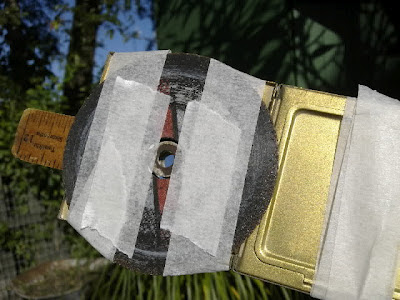However there are other events that the sun provides which this technique can be useful for and I think its important for people to realise that scientific purposed aparatus don't have to be complex.
My method used as its basis a pinhole camera method. However my focal length was very long (about 10 meters). Now while this may seem impossibly difficult its actually not needed to construct anything between the camera 'lens' and the projection surface.
Basically I used a mirror outside to reflect the sun back into my house on a wall and looked at the wall.
So my apparatus was constructed from:
- a mirror I had handy (in the form of one of my wifes powder cases)
- a grinder disk to give me a starting circle for the aperture
- a brass washer to stop down even smaller than the grinder disk aperture
This was then mounted to a ruler with masking tape and then mounted onto my tripod with more masking tape.
This was then projected a spot onto my wall where the diameter was about 11cm and the ingres of venus could be seen
So you can do heaps with bugger all if you want to. This fellows pages has many of the basic calculations you need to adapt this technique for observing all maner of solar events.
My point in all this is to try to pull back from the distraction of technology to the core point that it is Physics (and Chemistry) principles that are showing us the basis of the universe. Computers just assist and augment that.










.jpg)



1 comment:
Nice job! It was clouded over where I was so couldn't see any of it.
Post a Comment